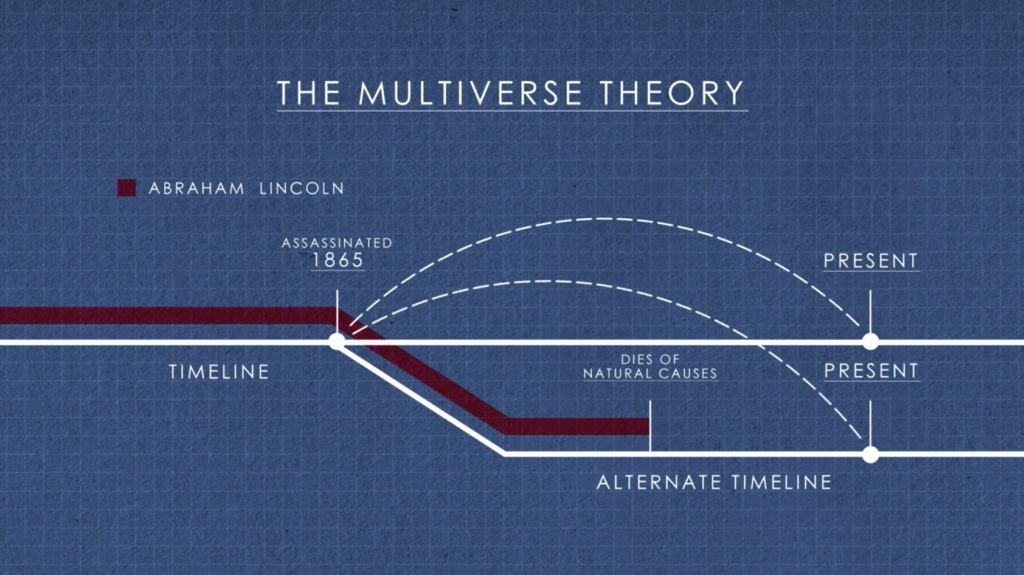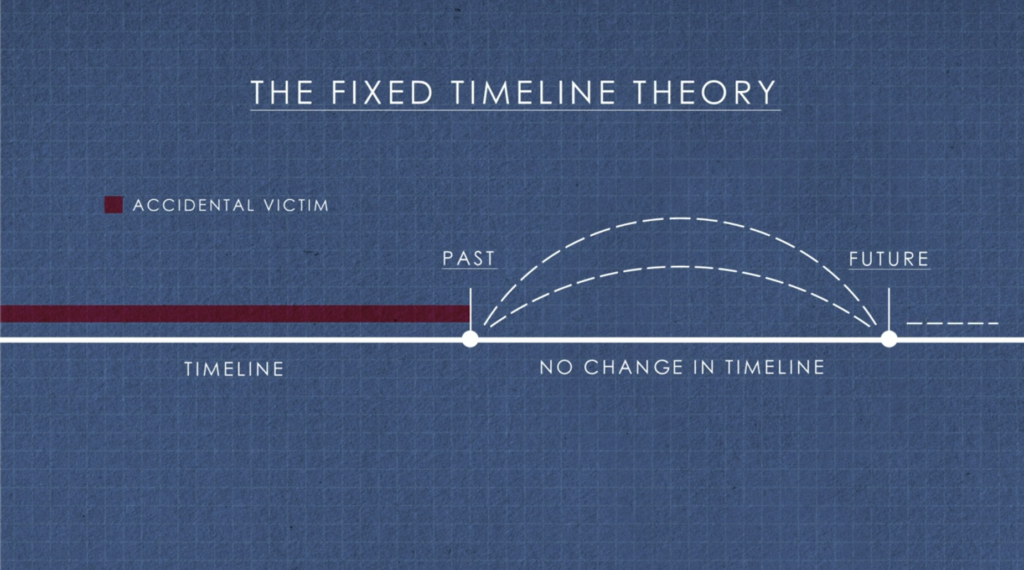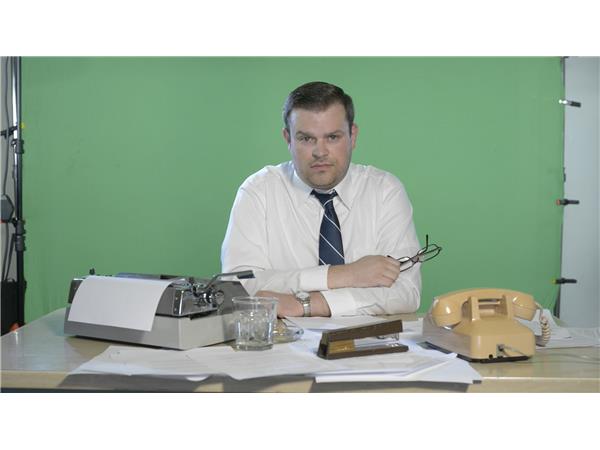I’ve always wanted to write a time travel novel, or a screenplay, showing the absurdity of the idea of time travel. If you think about it, basically it would be the story about those who are not traveling in time going mad from the insanity of it all. Right? I mean, after all, it is one of the attributes of God, … isn’t it? Wait… maybe not. God is Omniscient… right. Omnipotent. Sure. Omnipresent. Okay. Are any of those a time traveling component? Omnipresent isn’t exactly that. Is it? But I digress, if you were best friends with a time traveling phenom, you’d fail by definition. You’d be moving mono-directionally through time… but he? He’s not bound by the one way street sign. “Look, why weren’t you there for my son’s birthday party? Oh, wait. You were, never mind… I guess I need to take more of my happy pills.” It would be intense and depressing, and really really insane. Which is why I’m bringing this movie to you – The History of Time Travel Recommendation, because I wish I had crafted this crazy college film idea… In a word? I’m jealous. And you know what, you can watch it right here on Prime.
It’s an approximately 70-minute production with nearly zero production value going for it whatsoever. But do we at THiNC. even care a lick about those sorts of non-erudite kinds of things? No. We don’t. (Okay, a little.) But this film is all about the little details. The magic easter eggs that happen throughout the movie, in the backgrounds, in the maps, as the effects of time travel permeates the making of the film. But the movie can be summed up with this single quote – this interesting idea: “If you think Hitler with an atomic bomb is bad, imagine Stalin with a time machine.“
The History of Time Travel Recommended
Rick Kennedy, the writer and director of the film, an Austin State University in Nacogdoches, TX filmmaker (NOT AUSTIN STATE) tackled the idea of time travel and its historical potential ripple effects both corporately and personally. And it is this fictional documentary that premiered at the Austin Film Festival in 2014, but I’m only just finding out about it! I personally blame you for not telling me about it. Shame on you.
The film itself is what you would call a docudrama, a documentary of the Indiana Project – which was the United States’ time travel answer to our Manhattan Project. It was started as a response to Einstein’s worry that Hitler would crack the problem of time, and as a result, subjugate the world to his rule. It presumed that Hitler was less interested in nuclear power, and more interested in time. It relates the story of Physicist Edward Page (played by Daniel May), who has spent his life working too many hours in the hopes of cracking the secrets of time travel.
And even in the first five minutes the movie proposes a very interesting perspective on the two main theories (or conundrums) regarding time travel. Here was the film’s question of time travel from the perspective of the multi-verse perspective on the idea:

And also from the fixed timeline theory:

In the film, Edward takes the lead of the Indiana Project, which consumed more and more of his time, and he neglects his wife and his son. When Anne later died of polio, Edward was crushed by the turn of fortune for his wife. And haunted by the death of his wife, he spent every waking moment in the lab as a result. He’d spend the next 20 years hunting for a way to traveling through time and saving his wife.
In the fall of the 60’s, Richard followed in his father’s footsteps to MIT but in 1975 they shutdown the Indiana Project – and Edward’s research was discarded like the ravings of a madman. Edward takes it hard, and has a massive heart attack and dies. Worse, Richard lost his chance to chance to connect with his father through his research. Later, while going through his father’s things, he finds his father’s journal into all his research, and realizes that his father was determined to save his wife.
In 1985, Richard figures out how to travel forwards and backwards in time… but we do not know how he was able to do it. After a series of tests, Richard travels back in time in order to inoculate his newborn mother from polio. He is able to successfully save his mother – but is sent into a coma after returning. He then tries to convince his doctor brother Aiden to travel back in time to save their mother during his own child birth. After 14 years working together on the time machine, they decided they knew what they needed to do, travel back to 1953 to stop the car accident that killed their mother.
As the documentary investigates the truth of time travel, they are kept from seeing the entirety of the events that make up the trips necessary to create the resultant history, they were only able to see one true layer of changes, and are myopically focused on that one change. But we know all of the chaos that led up to that “one change.” Anne’s getting polio and dying. Anne’s surviving and then dying in child birth. Anne’s surviving child birth and Aiden’s being there to save her during child birth. They went back to save her from a car accident. And on and on it went.
“The word ‘history’ takes on a new meaning because of what they did… the word history becomes a living science because of what they achieved.”
And so it goes – their mother’s suicide in 1955 haunted the two brothers… it was what drove them to create the time machine. Anne had a recurring nightmare of a man who haunted her constantly stabbing her with needles. And after her surviving a horrible car accident she was haunted by her survival and thought that suicide was the only way to “cure her illness.” Instead of going back to stop her from committed suicide, they decided to help their father create the time machine faster, so that he would be there for their mother.
We can see that the resultant change is causing new realities, right? New baselines. And upon these new baselines we have the new resultant change that needs to be made. Polio. Childbirth. Car accidents. Father’s myopia. Etc. The only thing that the historians see is the new baseline, and the item that is changed. Okay, so instead of jumping back and stopping her suicide, they jump back and give their father the time machine earlier – WHICH – then gives the military the ability to jump backwards and revert World War II back to not happening. Nullifying Hitler? Brilliant. Except, Roosevelt tells the Indiana Project to stand down because he’s worried about unintended ramifications. But it was too late – someone else already had the guts to pull the trigger. Who? The Soviets.
The Russians had the time machine – but the Americans had Edward. Hahaha. But in this reality, Edward didn’t build the time machine, it was given to him by his two sons who traveled back in time. They gave it to him in order to keep him engaged with their mother – to keep her from committing suicide. So here we have Edward trying to convince the Americans that he can create it again – after a few years. Quickly though, the Americans began suspecting that Edward was in league with the Russians. But it didn’t matter because the Russians started beating the Americans at everything.
Sputnik? An American design. (Do you see where this is going?) And eventually, as a result, Yuri Gagarin eventually becomes the first man on moon. “One small step for Russian, on giant leap for Communism.”
Later, after Ann and Edward die – their sons discover Edward’s journal under a floorboard… which details the time traveling, the Soviets, the spies, etc., etc. And on the back of the photo of their parents is written, “In time you will save us.” And the sons begin the task of rebuilding their father’s time machine. The Americans and Russians take notice, and when the duo cause MIT to go dark through their experiments everyone starts to pay attention. This brings out the CIA, who take them both to a secret location. And suddenly, they are now in their father’s position – the government is on their every move. But with modern technology so vastly superior to technology 50 years prior, they are able to successfully recreate the time machine. But instead of turning it over to the Pentagon, Richard tells Aiden that he needs to go and save their parents alone.
Cut to the talking heads, sadly talking about how the Indiana Project was shut down, and all of the might-have-been’s. We watch though, and read between the lines… the globe behind the historians tells everything we need to know. The red that has spread across the globe magically, and irrevocably reverts back to the standard country lines. The talking heads say that they wish they had known what might have been. They talk about the failure of the Indiana Project clarifying our need to make every second count. Treasure every moment. We learn that they think that Edward’s accident, the explosion, the chaos, caused him to realize what was really important in life. Which was family. And that is where we reset again.
We trip back again. The narrative heads back to Anne as she having their second child, and her return to research in the 1950’s. Richard goes on to become a physicist (again) and Aiden becomes a doctor in neurology. After, Edward dies of cancer, and two years later, Anne passes away as well. After an experiment Richard has a stroke and Aiden watches over him. We got so close to discovering time travel… it’s too bad that we never cracked it. If Edward had, in fact, invented time travel, how would that have effected the world?? If time had been altered, would the world have understood it? The changes that had been made?
The History of Time Travel
You understand? Richard and Aiden did it. Although the time machine was stolen by the Russians – in an alternative timeline that was seeing the world completely fall under the control of Communism – they were able to invent a second time machine. And when Richard disappeared back in time, they were able to revert the variant of time wherein the Russians stole the time machine. Richard was able to keep the changes of time that kept his parents alive until they died of natural causes. Better yet, they reverted the timeline back to where it was before time travel was invented. And the only real change, after all the chaos, and the near disaster of global communism, was that their family was able to spend their time together… appreciating each other. Working together.
Why The History of Time Travel Is So Good
The movie is perfect in that it investigates two distinct ideas of science fiction when it comes to time travel. The Fixed and Multiverse ideas. But it does it in such a way that allows us to watch the reality of time travel, and what might actually happen if time travel really happened in the real world. During the Austin Film Festival Kennedy once stated:
“Time travel by its very nature is not logical — it’s impossible to make something illogical into something logical. So the idea with a time travel story is to make it seem like it’s logical, at least for the duration of the film’s running time. If I’ve done my job well, you will suspend disbelief and just accept the story.”
What’s better? Is that Kennedy basically used a bounty of stock video and public domain content in order to craft his movie. By using cleverly crafted interviews the film has, whole cloth, crafted a time travel movie that didn’t even happen! Like I said off the top, I have always wanted to craft a realistic time travel film – one in which people just are going mad because of the things they once thought was true, but now, is not. And here we have that movie… perfectly and totally conceived! And it’s just a college film project! So glorious.
If you are interested in other mind-jobby time travel movies that push the boundaries of what is really possible – then yeah, I have a pile of other interesting films for you to check out. The first is the show Dark (nothing touches Dark in the world of time travel films). The next centers on the idea of the multiverse in the show Devs. Want another super low budget time travel film? 41 is your guy. Or, what about, Synchronicity, Time Crimes, Russian Doll, Arq, and on and on we could go. (And I didn’t even mention the best time travel movie of all time?!?! How is that even possible? OK, I’ll mention it for crying out loud! Primer. There, you made me do it.)
Edited by: CY




